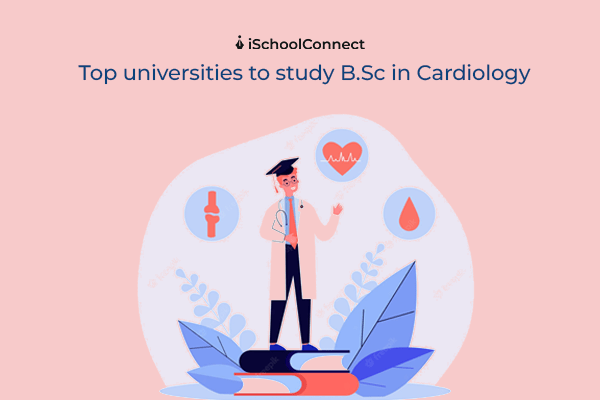Table of Contents
- What is BSc cardiology?
- Who can pursue BSc cardiology courses?
- Syllabus for BSc cardiology
- BSc cardiology colleges in India
- BSc cardiology colleges and universities abroad
- Job profile after BSc cardiology course
- Salary of a BSc cardiology graduate
- Scope of BSc cardiology
- What is after the BSc in cardiology?
- Key takeaways
- FAQ
What is BSc cardiology?
The human heart is one of the most complex organs of the human body, and cardiology is a section of internal medicine that deals with diagnostics and the treatment of different heart diseases.
Therefore, BSc cardiology or BSc in cardiac technology is a 3-year undergraduate paramedical degree course. However, this course has no direct connection with becoming a doctor, it is just a specialization. After passing the 10+2 exam, students can opt for this course.
Who can pursue BSc cardiology courses?
The following are the criteria that you need to fulfill to be eligible for BSc cardiology –
- Completing the 10+2 with science stream from any recognized board
- Need at least 55% marks in 10+2, but this will vary depending on the institute
- However, your choice of subjects in 10+2 should include physics, chemistry, and biology
Now, if you want to pursue this course in India, you don’t need to clear the NEET exam for it. Additionally, maximum institutes of India conduct a merit-based admission process for this course. Although, some of the institutes may conduct special entrance tests or interview processes or may want scores for SSSUTMS, CUET, NPAT, and AIIMS entrance exams.
However, if you want to study abroad, then you need to meet the following BSc Cardiology eligibility –
- Class 12-mark sheet
- Clear the English language proficiency test like TOEFL or IELTS
- SAT/ACT scores are also required in some cases
- A Statement of Purpose (SOP)
- And a Letter of Recommendation (LOR)
- Lastly, any other document specified by the university
Now that you are aware of the eligibility parameters, let’s move on to the BSc cardiology syllabus.

Syllabus for BSc cardiology
Since it is a 3-year degree course, the syllabus has been divided accordingly. The following section contains a detailed break-up of the same.
First-year
- Microbiology
- Human Anatomy
- Biochemistry
- Physiology
- Pathology- (Clinical Pathology)
- Hematology
Second-year
- Applied microbiology
- Applied pathology
- Introduction to the cardiac care technology
- Medicines for cardiac care technology
Third-year
- Applied cardiac care technology
- Clinical cardiac care technology
- Advanced cardiac care technology
With what is BSc cardiology, its syllabus, and eligibility out of the way, let’s move on to the colleges in India and abroad that offer this course.
BSc cardiology colleges in India
Here is an overview of some of the best BSc cardiology colleges in this country –
- Christian Medical College (CMC)
- SRM Institute of Science and Technologies (SRMIST)
- Madras Medical College (MMC)
- Annamalai University (AU)
- Madurai Medical College
- Government Kilpauk Medical College (GKMC)
- Chettinad Academy of research and Education
- Coimbatore Medical College
- Anantha Hospitals and research institute
- Thrissur Govt. Medical College
- Amrita School of Medicine
- Govt Medical College Kottayam
- Jawaharlal Nehru Medical college
- KLE University
- Srinivas University
- Chandigarh University
Apart from these, in case you decide to pursue your degree outside India, here are some top colleges that should be on your list.

BSc cardiology colleges and universities abroad
- Stenberg College
- Valencia College
- University of South Australia
- Brighton and Sussex Medical College
- National University of Ireland
- Barry University
- University of Leeds
- Massachusetts College of Pharmacy and Health Sciences
- University of Southampton
The course fee here solely depends on the college or university you are taking admission to. So, check with them to get a better understanding.
Job profile after BSc cardiology course
Once you complete your degree from any of the colleges mentioned above, be it in this country or outside, you will find employment in the following positions –
- Medical sonographer
Medical sonographers complete the imaging process of body parts in advance and report the findings to help the surgeon in diagnosis.
- Cardiovascular technologist
These technicians deal with equipment that is essential for the diagnosis of heart and blood vessels. They help doctors during the test and diagnosis process of any heat-related problems.
- Dialysis technician
These technicians help patients with kidney problems. Their job is to complete the scheduled dialysis process of every individual and compile and submit the report.

Salary of a BSc cardiology graduate
The annual salary of an individual working in this segment is in the range of $50,000 to $80,000. However, it depends on the hospital or the clinic you work for and your experience.
Besides cardiology, the benefits of pursuing a BSc degree are immense and it helps to share your career differently.
Scope of BSc cardiology
The field of BSc cardiology has tremendous scope all over the world. With the rapid progression of the global healthcare industry, the demand for well-trained, skilled, and experienced technicians will also increase substantially.
As the number of hospitals, both government and private, along with pathology rises, this need for technicians will also arise. Moreover, being a technical and less popular sector, the competition is also less, which will help you to find employment easily.
Another BSc course that has a lot of scope is the BSc in Nursing, it can be a great career option for you.
What is after the BSc in cardiology?
Additionally, after completing your bachelor’s degree in this field, you can choose to pursue higher education, which is a master’s and MD. Moreover, the specialization will add more weightage to your resume and increase your chances of employment.
Key takeaways
- The graduates of BSc Cardiology can open new avenues in paramedical science with a perfect combination of applied science, theoretical knowledge, as well as innovative technology.
- There are multiple colleges across the globe offering this course. Moreover, the scope of employment is notable as you will find a job in hospitals and private clinics easily. This course also provides an interesting career path for passionate aspirants.
- Lastly, after completion of the BSc degree, you can pursue further studies in MSc and MD for specialization and find better opportunities.
We hope you enjoyed reading this blog. In case of any queries, reach out to us or drop a comment below!
Liked this blog? Read next: Everything you need to know about the Medical Lab Technician Course
FAQ
Q1. Who can pursue the BSc cardiology course?
Answer- Anyone from the science stream in 10+2 with the minimum required marks can pursue this course.
Q2. What are the job prospects for the BSc Cardiology course?
Answer- The job prospects for BSc cardiology includes various opportunities such as dialysis technicians, consultant nephrologists, ICU intensivists, cardiac sonographer, etc.
Q3. What is the admission process for the BSc Cardiology course?
Answer- Although most institutes conduct a merit-based admissions process, some opt out of an entrance-based admissions process as well.
Q4. What does a cardiologist specialize in?
Answer- A cardiologist specializes in treating cardiovascular diseases.






